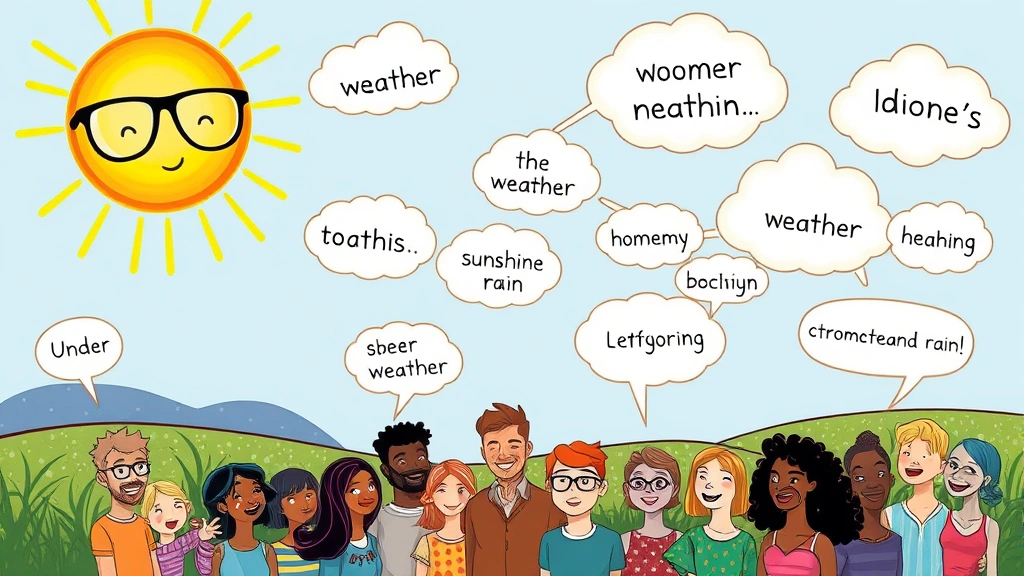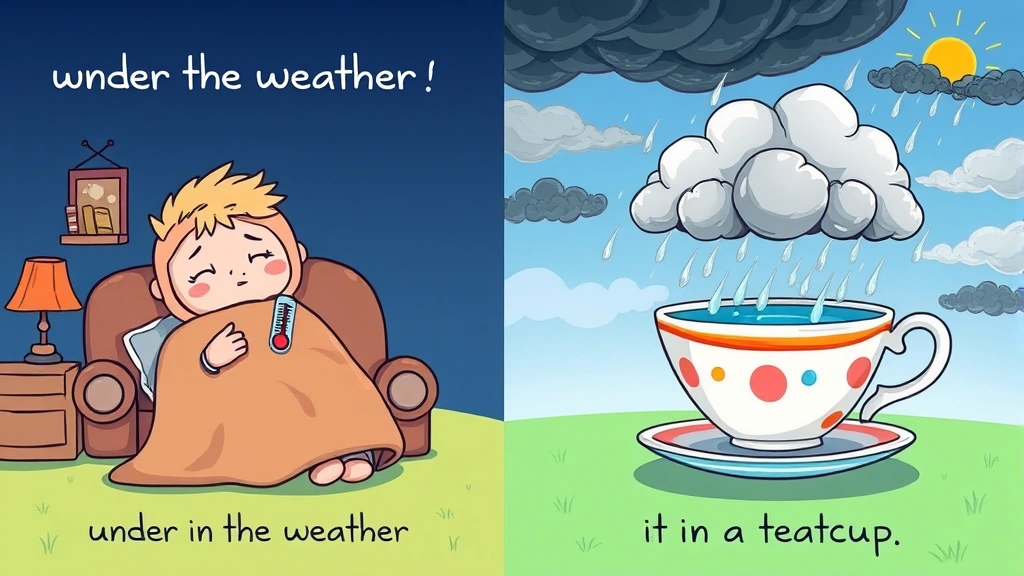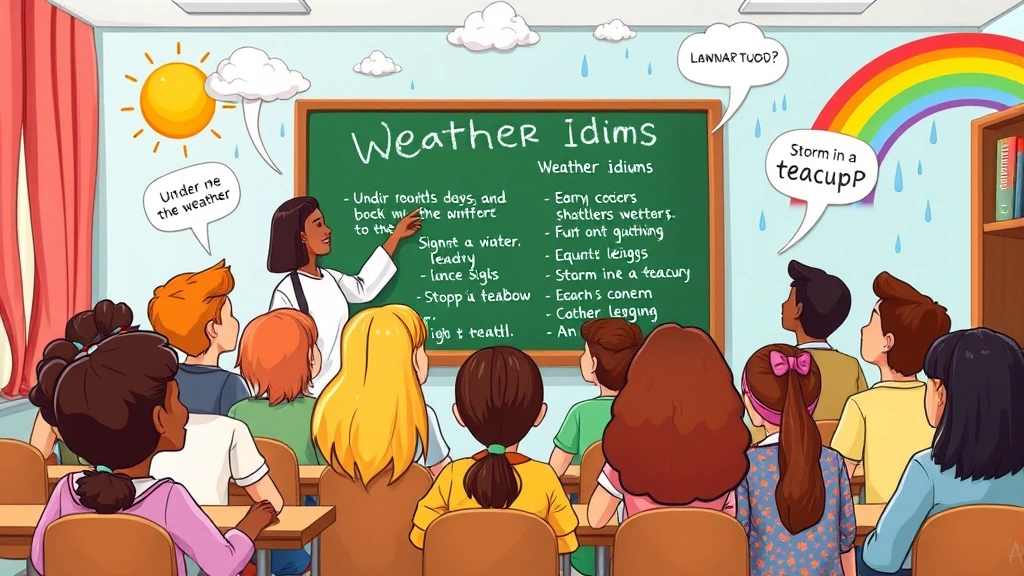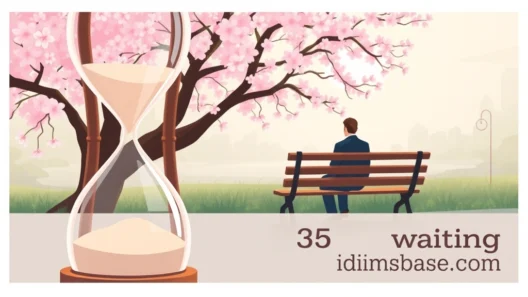Are you ready to sprinkle some linguistic sunshine into your vocabulary? Or perhaps you're hoping to weather the storm of tricky English expressions? Well, you've come to the right place! Idioms are those fascinating phrases that don't quite make sense literally but paint a vivid picture in our minds. And guess what? Many of them are inspired by the very thing that affects our daily lives: the weather!
Understanding these weather-related idioms can really help you sound like a native speaker and add a dash of color to your conversations. Whether you're chatting with friends, watching a movie, or just trying to understand a book, knowing these expressions will make a world of difference. Let's dive in and explore 35 fantastic weather idioms that will brighten your English!
35 Weather Idioms to Brighten Your English
Here's your go-to guide for 35 amazing weather idioms. Get ready to sprinkle them into your conversations!
-
Under the weather: Feeling unwell or sick.
- "I'm a bit under the weather today, so I think I'll stay home from work."
-
Storm in a teacup: A lot of fuss or anger about something unimportant.
- "Their argument about the dirty dishes was just a storm in a teacup; they'll be fine by tomorrow."
-
To weather the storm: To endure a difficult period or crisis.
- "The company managed to weather the storm of the economic downturn."
-
A fair-weather friend: Someone who is only a friend when things are easy or convenient.
- "When I lost my job, I realized Sarah was just a fair-weather friend."
-
Break the ice: To initiate social interaction in a situation where people are reserved.
- "He told a joke to break the ice at the beginning of the meeting."
-
Come rain or shine: Whatever the weather, or whatever the circumstances.
- "I'll be there for you, come rain or shine."
-
Every cloud has a silver lining: Every difficult or unpleasant situation has some positive aspect.
- "Losing my job was tough, but I found a better one. Every cloud has a silver lining!"
-
Get wind of something: To hear a rumor or a piece of information.
- "The boss got wind of our plans for the surprise party."
-
Have your head in the clouds: To be daydreaming or impractical.
- "She always has her head in the clouds, thinking about her next big adventure."

-
In a fog: Confused or uncertain.
- "After working all night, my brain was completely in a fog."
-
It never rains but it pours: When one bad thing happens, other bad things tend to happen at the same time.
- "First I lost my keys, then my car broke down. It never rains but it pours!"
-
Know which way the wind is blowing: To understand the current situation or prevailing opinion.
- "Before making a decision, it's wise to know which way the wind is blowing."
-
Lightning fast: Extremely quick.
- "The athlete ran the race with lightning fast speed."
-
On cloud nine: Extremely happy.
- "After getting the promotion, she was on cloud nine."
-
Pouring cats and dogs: Raining very heavily.
- "Don't forget your umbrella; it's pouring cats and dogs outside!"
-
Rain on someone's parade: To spoil someone's plans or enthusiasm.
- "I don't want to rain on your parade, but the restaurant is closed today."
-
Save for a rainy day: To save money or resources for a time when they might be needed.
- "It's always a good idea to save some money for a rainy day."
-
Shoot the breeze: To chat in a relaxed, informal way.
- "We spent the afternoon just shooting the breeze on the porch."
-
Snowed under: Having too much work or too many things to do.
- "I'm completely snowed under with assignments this week."

-
Stormy relationship: A relationship full of arguments and disagreements.
- "They've always had a stormy relationship, full of ups and downs."
-
Take a rain check: To decline an offer but suggest doing it at a later time.
- "I can't make it to the movie tonight, but can I take a rain check?"
-
The calm before the storm: A period of unusual quiet before a period of great activity or trouble.
- "The office was unusually quiet; it felt like the calm before the storm of the big project."
-
Throw caution to the wind: To act recklessly or without worrying about the consequences.
- "She threw caution to the wind and quit her job to travel the world."
-
To be a breeze: To be very easy.
- "The exam was a breeze; I finished in half the time."
-
To have a sunny disposition: To be generally cheerful and optimistic.
- "Despite the challenges, she always maintains a sunny disposition."
-
Weather the storm: To successfully deal with a difficult situation or problem.
- "The company had to weather the storm of the economic recession."
-
Whirlwind romance: A very fast and intense romantic relationship.
- "They had a whirlwind romance and were engaged within a month."
-
Windfall: A sudden, unexpected piece of good fortune, especially money.
- "The lottery win was a real windfall for the struggling family."
-
Chasing rainbows: Pursuing something impossible or impractical.
- "He's always chasing rainbows, hoping to get rich quick."

-
Cold snap: A sudden short period of cold weather.
- "We're expecting a cold snap next week, so bundle up!"
-
Gathering clouds: A sign that trouble or difficult times are approaching.
- "With the economy slowing down, there are gathering clouds on the horizon for many businesses."
-
In a whirl: Feeling confused or overwhelmed by a lot of things happening quickly.
- "After the sudden move, my life was in a whirl for a few weeks."
-
Like a breath of fresh air: Someone or something new and refreshing.
- "Her innovative ideas were like a breath of fresh air in the stagnant department."
-
To get snowed in: To be unable to leave a place because of heavy snow.
- "We got snowed in at the cabin for three days during the blizzard."
- To clear the air: To resolve a misunderstanding or disagreement.
- "Let's talk about what happened and clear the air."
Why Learn Weather Idioms?
Learning these idioms isn't just about memorizing phrases; it's about understanding the nuances of English and how native speakers express themselves. Idioms add flavor, personality, and depth to your language. They allow you to understand jokes, songs, and movies better, and they make your own speech more natural and engaging. Plus, it's pretty fun to discover how much of our language is inspired by the world around us, especially something as universal as the weather!
Key Takeaways
- Idioms are essential: They add color and depth to your English.
- Weather inspires language: Many common idioms are based on weather phenomena.
- Practice makes perfect: Use these idioms in your conversations to become more fluent.
- Context is key: Understanding the situation helps you grasp the meaning of an idiom.
- Sound more natural: Using idioms helps you sound more like a native speaker.
Frequently Asked Questions (FAQs)
Q1: What is an idiom?
An idiom is a phrase or expression whose meaning cannot be understood from the ordinary meaning of its words. It's a figurative expression that has a different meaning than its literal interpretation. Think of "raining cats and dogs"—it doesn't mean animals are falling from the sky!
Q2: Why are idioms important to learn?
Idioms are crucial because they are a fundamental part of everyday conversation for native English speakers. Learning them helps you understand cultural nuances, jokes, and informal language. It also allows you to express yourself more naturally and vividly, making your English sound more authentic and fluent.
Q3: How can I remember so many idioms?
Don't try to memorize them all at once! The best way to learn idioms is to:
- Learn in context: Pay attention to how they are used in sentences.
- Use them: Try to incorporate one or two new idioms into your conversations each week.
- Visualize: Create a mental image for each idiom (e.g., a teacup with a tiny storm).
- Categorize: Group idioms by themes (like weather, as we did here!).
- Review regularly: Go back and revisit the idioms you've learned.
Q4: Are weather idioms used in formal or informal settings?
Most weather idioms are used more often in informal settings, such as casual conversations with friends, family, or colleagues. However, some, like "weather the storm" or "come rain or shine," can be used in slightly more formal contexts to convey resilience or commitment. It really depends on the specific idiom and the overall tone of the conversation.
Q5: Can using idioms make my English sound better?
Absolutely! Using idioms makes your English sound more natural, sophisticated, and engaging. It shows that you have a deeper understanding of the language beyond basic vocabulary and grammar. It's like adding spices to a dish – it enhances the flavor and makes it more enjoyable!
Q6: Are there regional differences in weather idioms?
While many weather idioms are widely understood across the English-speaking world, some less common ones might have regional variations or be more popular in certain areas. The ones we've covered today are generally common and understood globally, so you're safe to use them wherever you are!
We hope this journey through weather idioms has been a breath of fresh air for your English learning! Keep practicing, keep exploring, and soon you'll be able to navigate any linguistic storm with ease. Which of these idioms is your favorite? Let us know!






